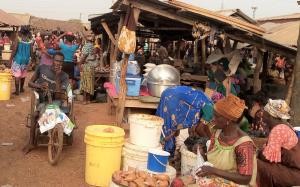Tackling hesitancy to boost COVID-19 vaccine uptake in Ghana
Accra – In his wheelchair, armed with a loudhailer, community volunteer Abednego Afreh goes from door to door in his neighbourhood, quelling the fears of his fellow Ghanaians as he urges them to get vaccinated against COVID-19.
His work, along with that of more than 100 other volunteers trained by the Ghana Health Service, with support from World Health Organization (WHO) and Gavi, the vaccine alliance, collectively mobilized and vaccinated about 90 000 people in all 11 districts of Bono East district, in just 15 days from 25 November to 9 December 2022
About one-third were vaccinated with their first dose, while the remainder received second or booster shots, marking significant strides to address vaccine hesitancy and the threat it poses to Ghana’s fight against the pandemic.
Afreh, 34 and from the Sene East District, was driven by a deep concern about the low uptake. He refuses to let his disability get in the way of what he believes is his civic duty to help educate his community about the critical importance of vaccination.
Despite the availability of vaccines, he says many people across the country were refusing to be immunized “because they fear something will happen to them after the injection.”
His message is that vaccines are crucial tools to help beat COVID-19. “I move from door to door and go to public places to encourage people to get their jabs,” Afreh says.
Explaining the depth of the challenge, Bono East Health Director Dr Fred Adomako-Boateng says the number of first-time vaccine recipients dropped significantly between two mass vaccination campaigns in these areas in February and July 2022. For the February one, about six in every ten people were first-time recipients. By July, that number had halved to about three in every 10.
“Sequential mass vaccination campaigns witnessed a consistent decline in the number of people accepting the vaccine, with about half of the target population yet to take their jab,” Adomako-Boateng says, adding that vaccination services are also available routinely.
In response, WHO, with funding from Gavi, the vaccine alliance, provided financial and technical support to the Government of Ghana to implement the community member-led demand generation strategy in the region last November.
WHO’s Representative to Ghana, Dr Francis Kasolo, notes that since Bono East is one of that country’s major international transit points, the risk of new variant importation cannot be underestimated. “It is therefore important to ensure adequate protection of the populace to mitigate spread,” he stresses.
The community educators received training in interpersonal communication. With cultural competence and subject knowledge, they address myths and misconceptions about COVID-19 vaccines to win over hesitant community members.
Afreh says: “The training was very critical in boosting my knowledge and confidence levels to engage and persuade people in our district to take the vaccine.”
Recently vaccinated Kofi Anoma is just one such person: “The videos circulating on social media made me scared to go for the vaccine, but then a community educator explained the issues to me.
“I took the vaccine and experienced no side effects except for a mild fever. I’m happy I took it and will come for the second dose when it is due,” he says.
The impact of the community educators has already proven the strategy to be a worthwhile investment in tackling vaccine uptake issues linked to lack of information and hesitancy. Going forward, however, the benefits are expected to be seen long into the future.
